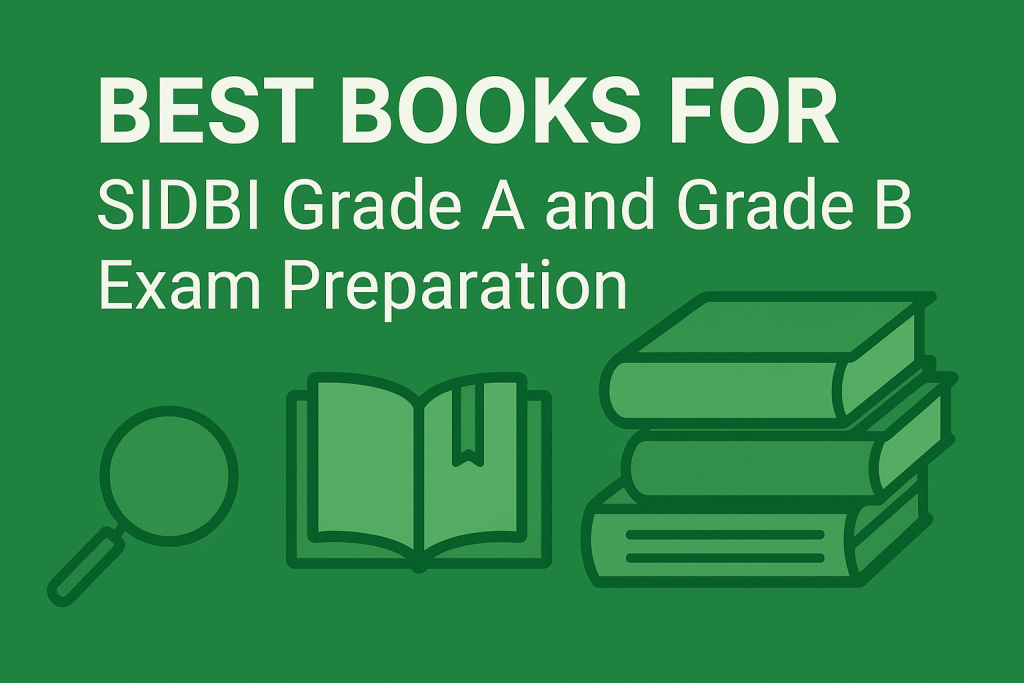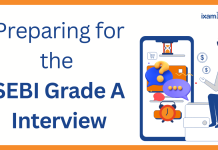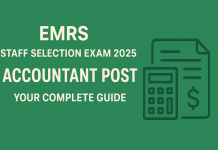The SIDBI Grade A and Grade B exam is a golden opportunity for all those who want to serve in the banking sector. The exam is conducted by the Small Industries Development Bank of India, also known as SIDBI, for the position of Assistant Manager or Manager.
Candidates have to prepare well for this competitive exam. The right selection of books related to SIDBI can give a good foundation in all required subjects. In this blog, we will take up the best SIDBI Grade A and Grade B books that can support candidates in their preparations. These books for SIDBI Grade A and Grade B preparation cover all kinds of relevant topics and provide valuable insight into the exam pattern and syllabus.

SIDBI Grade A and Grade B Exam Syllabus and Exam Pattern
The Small Industries Development Bank of India conducts the SIDBI Grade A/B Officer Exam, a very competitive government exam. The selection is sought for managerial positions, especially from the kind of talent to be nurtured further in the development of Indian MSMEs. The SIDBI Grade A and Grade B selection consists of two main stages. These are the Phase 1 Online Objective Test and Phase 2 Descriptive and Objective Test. Candidates who pass these two phases of online written exams will move on to the final interview.
Each phase tests a different aspect of the candidate’s analytical and logical abilities, reasoning skills, professional knowledge, and most importantly, writing proficiency.
Here’s a detailed breakdown of the SIDBI Grade A/B exam syllabus and exam pattern. It should help you make better sense and plan your preparations.
SIDBI Grade A and Grade B Phase 1: Online Objective Test
The Phase 1 assessment is an online test intended to assess a candidate’s proficiency in general aptitude, reasoning, and domain-specific knowledge. The test is comprehensive in nature, consisting of multiple sections, which contribute to the overall score. This SIDBI Grade A/B Phase 1 online test with a totally bilingual test (except for the English Language part).
It includes seven sections designed to test your skill in areas such as English, reasoning, quantitative aptitude, computer knowledge, and general awareness, besides MSME-specific topics and stream-specific knowledge.
Sections of this stage of the SIDBI exam include:
English Language:
This section checks your ability in English grammar, comprehension, and usage. It includes:
- Reading Comprehension: Passages with interpretative, inferential, and fact-based questions.
- Grammar: Questions on error spotting, sentence improvement, and phrase replacement.
- Vocabulary: Cloze tests, fill-in-the-blanks, and synonym-antonym identification.
- Sentence Arrangement: Questions in which sentences need to be reordered logically to form understandable paragraphs.
Reasoning Aptitude:
It is used as a measure of logical reasoning and problem-solving ability. Some key topics include:
- Puzzles and Seating Arrangements: Linear, circular, and floor-based arrangements.
- Logical Reasoning: Questions involving cause-effect, assumptions, and conclusions.
- Syllogisms: Deductive reasoning problems.
- Blood Relations and Coding-Decoding: Relationship and pattern identification.
Quantitative Aptitude:
This section is used to evaluate mathematical and numerical ability. Some key areas include:
- Data Interpretation: Graphs, tables, and charts requiring analysis.
- Simplification and Approximation: Rapid calculations for solving numerical problems.
- Arithmetic Problems: Time, work and their application, profit, loss, ratio, percentage, and averages.
- Number Series and Quadratic Equations: Patterns and algebraic problem-solving
Computer Awareness:
Testing your awareness of computers, networking, and the cross-section of cybersecurity. The major areas include:
- Basic Concepts: Hardware, software, operating systems, and input-output devices
- MS Office Applications: MS Word, MS Excel, and MS PowerPoint
- Cyber Security: Safe internet practices and data security
General Awareness:
Focus Area: Banking, Financial, and Current Affairs Specific Areas include:
- Banking & Financial Awareness: Key Terms, Policies, and Recent Developments.
- Economic and Social Issues: Government Schemes, Sustainable Development, and Social Sector Policies.
- Current Affairs: National as well as International news, Awards, Appointments, and Agreements.
MSME (Micro, Small and Medium Enterprises):
A special section testing your knowledge of MSME policies, their respective regulatory framework, and the role of SIDBI. Topics include:
- Government Schemes for MSMEs: PMEGP, CGTMSE, etc.
- Policy Framework: Growth of MSMEs under initiatives of SIDBI.
- Management of MSMEs: Financing, legal and operational strategy.
Streams-Specific Knowledge:
This differs according to area of interest (e.g. law, finance, economics). This talks about technical know-how as used in your area.
SIDBI Grade A Phase 2: Descriptive and Objective Test
Phase 2 Testing is more about testing your expression of ideas and professional expertise. Questions are both descriptive as well as objective.
Phase 2 Paper 1: English Descriptive Test
This test assesses your writing ability, such as clarity of thought, coherence, and grammatical accuracy. Candidates have to:
- Write an Essay: Usually the topics relate to banking, finance, MSME development, or some socio-economic issue.
- Draft a Precis: Summarize a passage concisely without losing key points.
- Compose a Formal or Informal Letter: Typically based on professional scenarios such as drafting letters to government officials or financial institutions.
Phase 2 Paper 2: MSMEs and Professional Knowledge
This is a two-part test that combines:-
Objective Questions: –
- Focuses on the policies related to MSMEs, initiatives undertaken by SIDBI, and domain-specific knowledge
- Key areas included here are financing strategies for MSMEs, NPA management, equity financing, and development policies
Descriptive Questions:
- Contains questions that require intensive knowledge of your stream.
- Candidates shall answer 4 out of 10 questions, comprising short (10 marks) and long (15 marks) answers.
Characteristics of Good Preparation Books
While studying for the SIDBI Grade A exam, studying from the right study material plays a vital role. The best preparation books must have certain characteristics that make your study session a worthwhile one.
SIDBI Grade A and Grade B Exam-oriented Content
Also, the books would be specifically designed for the SIDBI Grade A examination. It should cover all topics relevant to the examination; candidates would not feel burdened by information that is unnecessarily lengthy but could focus on preparing all they need to prepare for the examination. Focused content helps streamline the study process, allowing candidates to concentrate on what is essential for the exam.
Conceptual Clarity
Another important feature is conceptual clarity. Preparation books should explain the topics in a simple and lucid fashion. Conceptual clarity can be achieved through simple language, examples and illustrations of intricate concepts. When the basis or the candidates is clear, they are better prepared to answer more complex questions later on.
Practice-oriented Approach
Practice-oriented preparation best prepares an individual for a test. The best books would include a range of practice questions that can cater to different level of difficulty beginning from basic to an advanced level of difficulty. These books should also provide detailed solutions to each question so candidates can learn from their mistakes as well as understand the solution to correct answers. Regular practice boosts confidence and enhances one’s problem-solving ability.
Recent Developments
Books on subjects like General Awareness and information regarding MSMEs will always be up to date. Resources to be used should always have data, policies, and new developments on these issues, so keeping track of news and recent changes in regulatory procedures will ensure success at the exams.
Mock Test Incorporation
Some preparation books also include integrated mock tests, which can be an excellent means of self-assessment. These mock tests simulate the actual exam environment and give candidates an idea of whether they are ready or not.
Books for SIDBI Grade A and Grade B Preparation: Phase 1
The preparation process for the SIDBI Grade A and Grade B exam needs to be approached strategically and with careful resource selection. The paper structure is also comprehensive. The sections that it involves include reasoning, English, quantitative aptitude, general awareness, MSME and SIDBI-specific knowledge, and stream-specific expertise. This can be only achieved by reading books and study material strictly tailored for the needs of this exam. Let us discuss what resources each section requires and what constitutes a good book, supplemented with added resource materials like mock tests, previous year papers, online courses, etc.
English Language Section Preparation
The section on the English Language tests a candidate’s grammar and vocabulary, comprehension, and writing in the language. To prepare well, candidates need books explaining grammatical rules fairly lucidly, supplemented with numerous examples and exercises. They should also include vocabulary building through exercises focused on the usage of synonyms, antonyms, idioms, and phrases. Comprehension: A majority portion of the English section entails books having passages for practicing. So, there will always be a mix and an ideal choice of practice books consisting of different types such as fact, analytical or even abstracts. Learning the English section not only puts points into your score but also boosts communication skills quite valuable in the corporate field also.
Recommended Books:
- “High School English Grammar and Composition” by Wren & Martin: An excellent resource for grammar and sentence formation.
- “Word Power Made Easy” by Norman Lewis: Ideal for building vocabulary.
- “Objective General English” by S.P. Bakshi (Arihant): Covers grammar, vocabulary, and comprehension exercises.
Preparing for the Reasoning Aptitude Section
The Reasoning Aptitude section tests logical reasoning, analytical skill, and ability to solve problems. The section includes topics like puzzles, seating arrangements, syllogisms, coding-decoding, and many more. To prepare for this part, the candidate needs books that explain reasoning fundamentals step by step. The books should have a lot of solved examples with wide-range explanations of different solving techniques so that candidates can handle tough ones with relative ease. The practice sets at different levels of difficulty are also important to the building of speed and accuracy necessary to master this section. The area of mastering reasoning involves testing your ability to think critically and apply logic under time-constrained conditions.
Recommended Books:
- “A Modern Approach to Verbal and Non-Verbal Reasoning” by R.S. Aggarwal: A comprehensive book covering all reasoning topics.
- “Analytical Reasoning” by M.K. Pandey: Ideal for strengthening logical and analytical reasoning.
Building Your Quantitative Aptitude Skills
Quantitative Aptitude is the most challenging section in many candidates’ opinions as it requires solid numerical and problem-solving skills. Candidates who want to prepare effectively require books that explain complex mathematical concepts in a simple manner with clear illustrations. Good quantitative aptitude books have to focus on basic topics, such as arithmetic, algebra, data interpretation, and number systems.
Shortcut techniques and time-saving strategies to solve problems quicker is another feature that should be able to find in a good quantitative aptitude book. For this section, ample practice is the most significant thing, so books need to have a large amount of questions with solutions catered to all the difficulties arising in a question. A good command of quantitative aptitude does not only help you clear the exam but also develops analytical skills, which is invaluable in the banking and finance sector.
Recommended Books:
- “Quantitative Aptitude for Competitive Examinations” by R.S. Aggarwal: Covers all quantitative topics with plenty of solved examples.
- “Fast Track Objective Arithmetic” by Rajesh Verma (Arihant): Focuses on shortcut techniques and practice questions.
- “Data Interpretation” by Arun Sharma: Essential for mastering DI questions.
Computer Knowledge
Computer Knowledge is the most critical section of an assessment of how well a candidate is familiar with the basic concepts of computers, networking, and cybersecurity. Good books on this section must be recent and must include computer basics, hardware and software, operating systems, networking concepts, and IT security. A good book about computer awareness should have theoretical explanations followed by multiple-choice questions as practice opportunities. Understanding the latest cybersecurity trends and new digital trends, because technology forms the crux of the financial world. This section will be helpful for the candidates so that they can display that they can perform in a techno-driven banking environment.
Recommended Books:
- “Computer Awareness” by Arihant Experts: A comprehensive guide for computer basics.
- “Objective Computer Awareness” by R. Pillai: Includes theory and MCQs for practice.
Achieving Excellence in General Awareness
General Awareness is a critical section in that it examines the candidate’s awareness of current affairs, banking, finance, and economic awareness. The candidate would require regular updates in the appropriate resources in respect of government policies, new developments in banks, and world economy trends.
Books on banking awareness, financial systems, and economic policies are the mainstays of preparation for this part. To be updated on current affairs, the candidate should support his reading with monthly magazines, newspapers such as The Hindu or Economic Times, and dedicated current affairs compendiums. This section is dynamic in nature and requires consistent effort to stay updated with recent developments, especially those relevant to MSMEs and the banking sector.
Recommended Books:
- “Banking Awareness” by Arihant Experts: A go-to book for banking and financial knowledge.
- “Manorama Yearbook”: Ideal for general knowledge and current affairs.
- Monthly Magazines and Newspapers: Read publications like Pratiyogita Darpan, Economic Times, or The Hindu for updated content.
Special Preparation for MSME and SIDBI-Specific Knowledge
The MSME and SIDBI Knowledge section is unique to this exam and requires targeted preparation. Candidates should familiarize themselves with the functioning of MSMEs, government schemes like PMEGP, CGTMSE, and SIDBI’s initiatives. Some of the best resources for this section include government publications, annual reports from SIDBI, and materials that provide a detailed understanding of MSME policies and frameworks.
The candidate must also pay special attention to the role SIDBI plays in the economic development of the country and its efforts supporting small businesses. Mastering this section showcases the candidate’s awareness of the fundamental missions of SIDBI, thereby making them a strong contender for the post.
Recommended Books:
- “Indian Economy” by Ramesh Singh: Offers a good understanding of MSMEs and the economy.
- Government Scheme Booklets: Publications by the Ministry of MSME.
- SIDBI’s Official Website and Annual Reports: For accurate and up-to-date information on its operations.
Stream-Specific Knowledge Preparation
For those appearing in specialized streams like law, finance, or economics, preparation requires domain-specific resources. Ideally, books selected should cover the basic concepts with broad detail and their practical application in the form of a previous year’s question paper or case study. For example, the books for legal aspirants would be ones dealing with Indian laws and legal reasoning. The finance aspirants require materials to go deep into financial management, capital markets, and taxation. For economics candidates, the books could clarify areas of microeconomics, macroeconomics, and public policy. These resources should include both objective questions and descriptive exercises.
Books for SIDBI Grade A and Grade B Preparation: Phase 2
The descriptive writing section is crucial in the exam, as it will assess the candidate’s ability to articulate his thoughts in a coherent yet concise manner. In any SIDBI Grade A exam, this section consists essentially of essay writing, letter writing, and precis writing. Books that cover all of these very basic writing skills and provide enough practice exercises along with examples relating directly to the banking and finance realm should be essential in acing this area.
Here are a few books that can be referred to for descriptive writing:
“Descriptive English” by S.P. Bakshi and Richa Sharma
This is an all-encompassing guide in writing essay, letter, and precis. It has been especially designed for competitive exams to provide clear and structured guidance on how to really present meaningful responses.
It simply breaks down essay writing into doable steps so that candidates can organize thoughts so effectively. Moreover, with the focus on formal and informal letter-writing formats, the requirement of SIDBI candidates is also met correctly. Highly practical for candidates because of relevant practice exercises.
“Essays for Civil Services and Other Competitive Examinations” by Pulkit Khare
It lays an excellent foundation for essay writing, especially on topics that overlap with the banking and financial sectors.
The essays on economic policies, financial inclusion, and governance in this book closely align with SIDBI’s key focus areas. The tips for structuring essays, using relevant data, and articulating ideas are truly practical and of great help in developing professional writing skills required in the exam.
“151 Essays for Competitive Exams” by Disha Experts
This book is ideal for candidates who are searching for varied essay topics. It contains pre-written essays based on current issues and guides the candidate to frame his/her style.
The essays on financial reforms, MSMEs, and global economic trends present a perfect relevance in this book for the SIDBI exam. It also gives tips on how to present excellent introduction and conclusions so that the applicants present a lasting impression in their descriptive answers.
“High School English Grammar and Composition” by Wren & Martin (with Key)
This classic book is, therefore, an invaluable publication to enhance one’s grammar, sentence construction, and composition skills that are essentially vital for writing well.
Although it mainly deals with grammar, the book has sections on letter writing and comprehension- enabling candidates to hone their basic writing skills. In so doing, its exercises ensure that the candidates write essays and letters free from grammatical and other types of errors that are always considered vital in a competitive exam scenario.
“Banking Awareness” by Arihant Experts (Descriptive Writing Section)
This book provides a very unique combination of banking awareness topics and practice for descriptive writing.
It specifically targets essays and letters related to banking applications, requests, and complaints, often asked in the SIDBI Grade A exams. It gives ample experience to candidates to take up any genre as well as banking-specific writing tasks.
“Word Power Made Easy” by Norman Lewis
It is only by having an ample vocabulary that good essays and letters are written, and so this book is the perfect source for vocabulary building.
The book then offers simple practice exercises to build a rich vocabulary. Moreover, it maintains that proper usage of words makes the written communication effective enough in descriptions, allowing candidates to churn out writing with a professional look. Clarity and crispness are usually what differentiates high-scoring essays from mediocre ones.
“Art of Effective Letter Writing” by S.C. Gupta
This book is a perfect choice when it comes to mastering formal as well as business letter writing. The book offers detailed formats and examples of formal letters on professional communication. This becomes extremely useful for the SIDBI exam, where the candidate may be asked to write complaint letters, requests, or banking-related correspondence.
The Importance of Supplementary Resources
While books form the study material, supplemental materials are as important to ensure success. SIDBI mock tests are a necessity, as they represent the actual environment at the time of examination, which builds up the candidate’s speed and accuracy along with a certain level of confidence. Solving previous year papers gives candidates insights into the pattern, types of questions, and difficulty levels involved in the exam. Furthermore, seeking SIDBI Grade A online courses comes with structured support from expert faculty members, video lessons, and interactive sessions. Additional aid in preparing can also be created by using monthly current affairs PDFs, descriptive writing practice materials, and also group study sessions.
Conclusion
The SIDBI Grade A exam requires quality books with a balance of regular practice through strategic use of supplementary resources. Candidates can augment their chances of success in this highly competitive exam by focusing on the right material and consistent effort.
At ixamBee, we specialize in providing comprehensive online courses for government exams and online courses for government jobs. Our expertly designed courses for government jobs cater to a wide range of upcoming government exams. Whether you’re preparing for specific courses for government exams or seeking general guidance, ixamBee offers the resources like Beepedia previous year papers, SSC CGL, SSC CHSL, SSC MTS and other mock tests to succeed in exams like RBI Grade B, SEBI Grade A, NABARD Grade A, RRB NTPC, SSC MTS, NIACL Assistant, and more.
Also Read:
Preparing for RBI Grade B Exams with NCERT Books
NABARD Grade A and DA (Development Assistant) Exam 2025: Expected Date & Preparation Strategy
How to Prepare for the FCI Exam?













